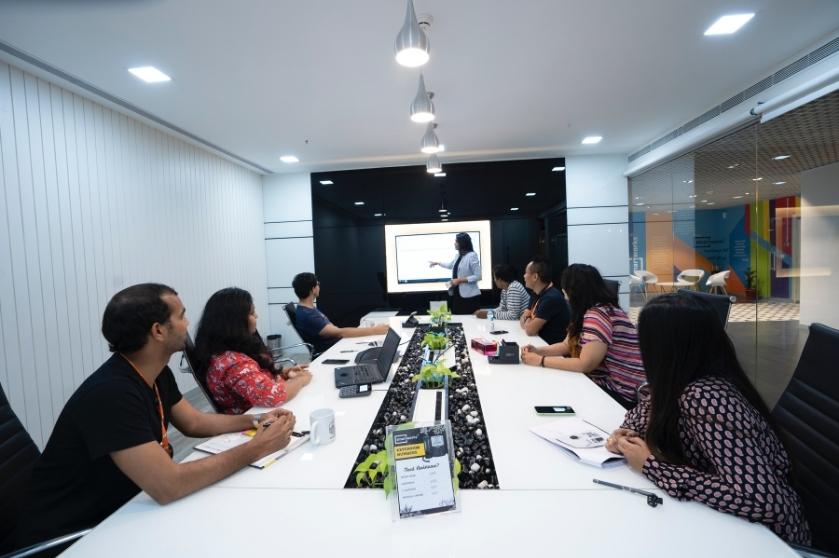
The most successful candidates understand how to speak confidently about their technical and transferable skills in ways that sell their professional value to employers. View a more detailed interview prep guide in the Behavioral Interview Prep Guide.
Universal Interview Questions
Tell me about yourself.
Think about your past (previous experience and education), present (your current job and how it’s preparing you for this role), and future (why you want the job you’re interviewing for).
What are your greatest strengths and weaknesses as a business professional?
Consider the job description and the required skills in the posting and align your answer with a skill you’ve mastered. Discuss your areas of expertise and how they will benefit the organization, team, or position. For weaknesses, discuss areas for improvement and what you’re actively doing to improve those skills. Do not cite necessary skills for this position as weaknesses.
Why do you want this job?
Demonstrate that you’ve researched the company, what you like about it, and why your skills would be a good fit for the job. Explain how the role will contribute to your career progression and what you can contribute to the team. Be specific and express enthusiasm about potentially working for the company.
Where do you see yourself in five years?
This question is designed to probe your career goals and vision. Tell your interviewer about your career aspirations and ambitions. Express your desire to succeed and explain how this job will contribute to your progress. This is an opportunity to show that you are goal-oriented and that you have a plan to achieve your goals.
What are your salary expectations?
Prepare thoroughly for this question. Research salary ranges for this particular job, this industry, and your geographic area. Use websites like Payscale.com or Salary.com. The interviewer wants to know how you value yourself. To avoid leaving money on the table, it is okay to ask how the interviewer values the role before stating your expectations. Aim high, but within the range you’ve researched, and be prepared to provide examples of why you’re worth the salary that you cite. Attend our salary negotiation workshop to learn more about negotiating a salary you deserve.
Career Persona Interview Questions
The next questions are curated according to career personas – where someone is in their career. See the persona characteristics below to help you decide which questions are best for you.
Career Starter
- Little to no professional experience.
- Recent graduate or currently in program of study.
- Likely pursuing a junior, associate, or other entry-level role.
- Transferable skills from other work unrelated to field of study. This includes paid or unpaid work.
Career Switcher
- Unsatisfied with current career path and seeking a new one.
- Unrelated professional experience.
- Transferable skills from previous professional work experience.
- Likely seeking entry-level roles, but may qualify for higher-levels depending on previous professional experience.
Career Advancer
- Related professional experience.
- Currently holds a mid-senior level role within the field.
- Likely seeking senior, director, or executive level roles within the field.
Career Starter Interview Questions
What class projects or assignments best prepared you for this position?
This is a great opportunity to discuss coursework you’ve enjoyed, as well as how it has shaped your interest in specific business paths. Focus on accomplishments that allow you to demonstrate relevant skills.
Tell me about a tough problem you recently tackled. How did you handle it?
This question is designed to assess your competency in dealing with and resolving problems. Use the STAR Method to answer. Describe the situation and task at hand. Tell them about your direct actions, then detail the results of your actions. Avoid personal problems; select problems that are relevant to the work, your business interests, as well as those that will impress your interviewer.
Tell me about a time you had to learn something completely new.
The interviewer is trying to assess how open and eager you are to learn. Every employer is looking for entry-level candidates that are willing to develop a new skill or take on new assignments for the good of the team. Identify a time when you had to learn something completely different from your area of expertise or interests, then focus on why you decided to pursue it and how you actually picked it up.
Do you have any questions for me?
Interviewers often ask this question to gauge your interest and see if you’ve researched the company. Prepare a few questions in advance, but keep in mind that your questions may get answered in the course of the interview. To show you’re engaged with the interview process, generate questions related to work, company culture, or day-to-day responsibilities of the job.
Career Switcher Interview Questions
Describe how you typically approach a project.
Since you’re an experienced professional, interviewers will want to know more about your workflow, problem-solving ability, and organizational skills. Explain general processes you work through and deliverables you typically produce. Focus on action steps you take to describe your relevant and transferable skills.
How would you work with a difficult stakeholder?
As a business professional, you will work with many different internal and external personalities. This question assesses your communication skills and how you resolve difficult situations. Provide an answer that describes how you successfully navigated working with a difficult client/customer. Use the STAR Method to structure your response.
Why are you leaving your current job?
This can be a tricky question; always remain positive. When discussing your current company or environment, give a truthful reason as to why you’re leaving, but do not bring any negativity into the discussion. Focus your answer on developing and expanding your career in the business field. Share what you’ve learned about this potential new employer and how it’s a good fit for your goals, strengths, and experience.
How do you prioritize tasks and manage deadlines?
Your response to this question will show the interviewer how effectively you determine what tasks need more attention than others and how you manage your time. Answer by describing how you track projects, tasks, and deadlines. Include specific examples of how you manage your work to assure the interviewer that you are well organized and can submit work on time.
Career Advancer Interview Questions
Why do you want to be a leader in our company?
Your response to this question gives the interviewer a sense of how much you’ve thought through what this leadership role entails and if you are ready for the responsibilities. They may also want to assess how well your professional values align with the company values. Discuss what you enjoy about being a leader and/or experiences that have prepared you for leadership.
What is your management style?
This question is designed to assess how you see yourself as a business leader and how you’ll lead others. Explain what you believe makes a good leader, then provide examples of how you meet and exceed those expectations.
What would you want to accomplish within your first three to six months of employment?
The interviewer wants to know that you’ve put some thought into an action plan for potential work at their company. If the interviewer has shared expectations with you, or any pain points they are currently facing, this question is an excellent opportunity to address those factors.
Can you tell me about a time when you had to make an unpopular business decision?
The key to this question is understanding that they are more interested in how you handled the decision than the decision itself. Talk about why the decision was unpopular, the data or information you used to inform your reasoning, how you rallied support, and the immediate and long-range outcomes. Demonstrate your leadership style, accountability, and business acumen.
Pro Tip:
Always keep answers positive! Demonstrate what you’ve learned from your program and work experience. Structure anecdotal examples using the STAR framework (Situation, Task, Action, and Result) for behavioral questions to provide details about your accomplishments, transferable skills, and business prowess.



